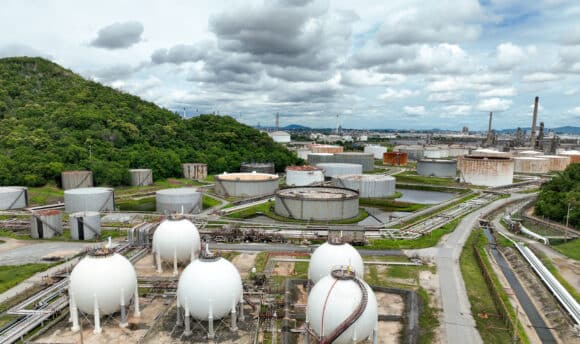Photos from Zurich are here
Photos from New York are here
May 19, 2021 (New York, NY) — 70 groups delivered a letter today calling on Chubb CEO Evan Greenberg to strengthen Chubb’s weak coal policy and stop insuring new oil and gas. Citizen groups wearing Evan Greenberg masks delivered the letter to Chubb headquarters in New York, Zurich, and San Francisco in advance of Chubb’s May 20th shareholder meeting.
Chubb was an early climate leader among U.S. insurers. It became the first U.S. company to adopt a coal policy in July 2019, and Greenberg is one of few U.S. insurance CEOs who has been outspoken on the need for the industry to do its part on climate. Greenberg said that Chubb’s coal policy reflected “Chubb’s commitment to do our part as a steward of the Earth.”
“Greenberg simply isn’t living up to his rhetoric on climate. Providing the insurance fossil fuel companies need to keep destroying our planet is certainly not being a good steward of the Earth,” said Angelina Dobler, Climate Campaigner at Campax. “We are in the midst of a climate catastrophe, and Greenberg’s continued refusal to take action means Chubb is falling further and further behind its global peers.”
A groundbreaking report released yesterday by the International Energy Agency concludes that there is no room for any new coal, oil, or gas in a net-zero by 2050 pathway. For insurance executives who claim to care about preventing climate catastrophe, there is no longer any justification to support fossil fuel expansion. Yet Chubb continues to support new fossil fuel projects around the world; it has not even ruled out insuring new coal mines.
“There is no excuse to support new coal, oil, and gas projects that are torching our planet,” said Pete Sikora, Climate & Inequality Campaigns Director for New York Communities for Change. “If Evan Greenberg wants Chubb to be a climate leader, he should rule out all new fossil fuel projects, like yesterday. Anything less is corporate greenwashing.”
At least 26 major insurers worldwide have adopted coal policies, most of them stronger than Chubb’s. Insurers have also begun to take action on tar sands, Arctic drilling, and even oil and gas more broadly.
Chubb, meanwhile, is also among the world’s top-eight insurers of oil and gas. Chubb continues to insure climate-wrecking projects like the Trans Mountain pipeline in Canada, which has become so toxic that Trans Mountain recently applied for—and was granted—the right to hide the names of its insurers. Organizations across the U.S. and Canada are planning a week of actions at the headquarters of Trans Mountain’s insurers this June to demand that they drop the project. Eleven insurers have ruled out insurance for the carbon-intensive tar sands sector, but Chubb has not.
Chubb has not even ruled out new coal projects, such as the Adani Group’s Carmichael mine in Australia, which at least 35 insurers have said they will not insure. By only restricting insurance for companies that derive more than 30% of their revenue from thermal coal mining, Chubb leaves the door open to insure coal projects for massive, diversified companies.
The letter, which was signed by Indigenous Peoples, climate justice groups, community organizations, and public health groups, notes that Chubb has not taken a single step on climate since adopting the 2019 policy: “Through your refusal to take further action, Chubb has gone from a leader to a laggard.”
The actions at Chubb come the day after rallies outside The Hartford and Travelers in Connecticut calling on the insurers to drop fossil fuels.
“The campaign to hold insurance companies accountable for their role in the climate crisis escalated this week with actions in the US and Europe,” said Elana Sulakshana, Energy Finance Campaigner with Rainforest Action Network. “As insurance companies drop coal, some coal companies are unable to get the insurance they need to operate. But global laggards like Chubb and Travelers are enabling new fossil fuel projects worldwide. If they took a stand, it could speed up the transition to renewable energy. Our message is simple: stop insuring the fossil fuels destroying the planet. Insure our future instead.”
The groups called on Chubb to adopt the following measures, in line with the Insure Our Future campaign’s demands:
- Immediately stop insuring new and expanded coal, oil, and gas projects.
- Immediately cease insuring coal companies.
- Phase out, in line with a 1.5°C pathway, insurance for oil and gas companies.
- Divest all assets, including assets managed by third parties, from coal, oil, and gas companies not aligned with a 1.5°C pathway.
- Bring stewardship activities, membership of trade associations and public positions as a shareholder and corporate citizen in line with a 1.5°C pathway in a transparent way.
- Establish robust due diligence and verification mechanisms to ensure clients fully respect and observe all human rights, including the right to Free, Prior and Informed Consent (FPIC) as articulated in the UN Declaration on the Rights of Indigenous Peoples.
It also calls on Chubb to:
- Commit not to insure the Trans Mountain pipeline and its expansion in advance of the August 31, 2021 renewal date.
***
Insure Our Future in the U.S. is a campaign comprising environmental, consumer protection, and grassroots organizations holding the U.S. insurance industry accountable for its role in the climate crisis. It is part of the global Insure Our Future campaign, which promotes a rapid shift of the insurance industry away from supporting and financing fossil fuels to accelerating the transition to a clean energy economy.
For more information, contact: Jamie Kalliongis, (314) 651-7497, jamie.kalliongis@sunriseproject.net



